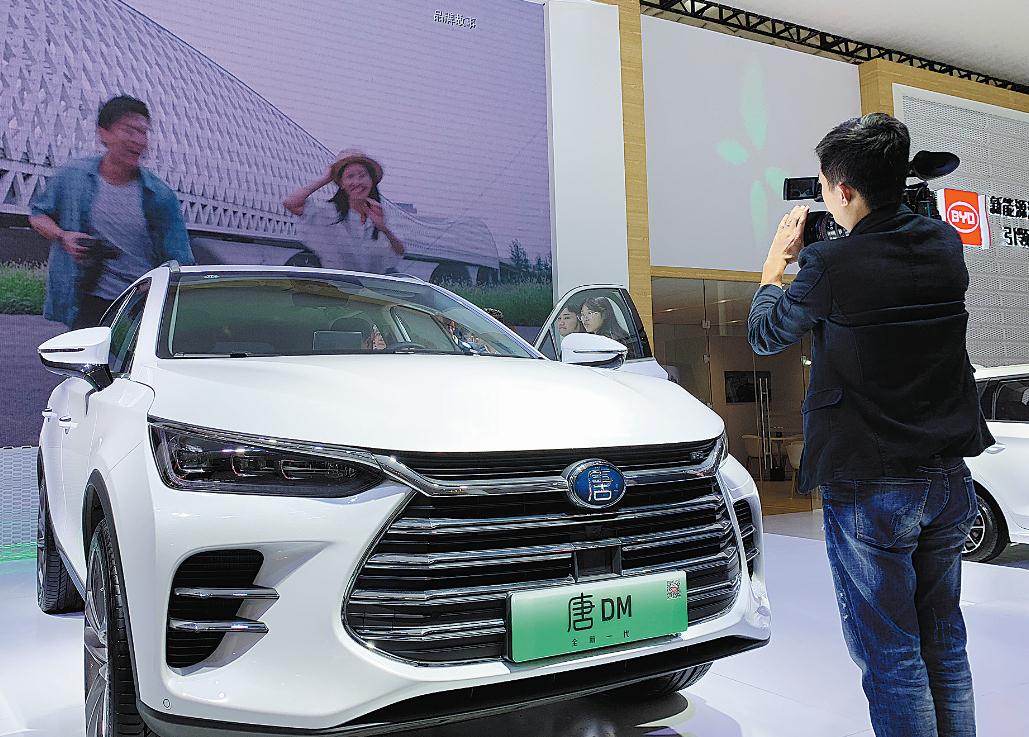NEV makers raise prices to offset drop in govt subsidy
By Zhang Dandan | China Daily | Updated: 2019-02-25 10:52

Ultimately, insiders say, prices should decline because of growing competition, falling costs
As China is slow to release its subsidy-cutting scheme for 2019, some new energy carmakers have raised sticker prices to ensure their profit, but insiders expect that the prices of new energy vehicles will drop again eventually.
The subsidy may drop as much as 50 percent from the previous year, which means 70,000 yuan ($10,450) less for one electric car sold, thus causing great financial stress on carmakers considering rising component costs, the Economic Observer reported.
With the scenario in mind, many new energy automakers have started to increase their selling prices and introduced measures to stimulate consumers to buy cars as soon as possible.
Startup Xpeng Motors has announced that the selling prices of its first model Xpeng G3 will increase to 155,800-199,800 yuan from 135,800-165,800 yuan at the beginning of this month, up by almost 15 percent.
Sitech Dev, another startup based in Southwest China's Guizhou province, has raised the prices of its first model DEV1 by 5,000 to 6,000 yuan since Jan 24.
Difering from Xpeng and Sitech Dev's increasing selling prices directly, Shanghai-based Nio Inc has been coaxing potential customers to place orders as early as possible to prevent price hikes.
Nio announced that the customers can enjoy the same subsidy carried out in 2018 as long as they buy Nio ES8 this month and get the license plate before the release of the 2019 national new energy vehicle subsidy policy.
BYD, China's leading electric vehicle maker, has similar measures: Car buyers who get the license plate before March will receive the same subsidy as they would have in 2018, according to a retail store of BYD in Beijing, the Economic Observer reported.
However, in contrast to the carmakers' resorting to raising prices and stimulating consumption, Yu Qingjiao, secretary-general of the Zhongguancun New Battery Technology Innovation Alliance, said that the price hike will not become a trend, but a temporary phenomenon.
And in fact, the prices of new energy vehicles will decline as a whole, according to the Economic Observer.
The report noted that the upstream industries, including the battery, electric motor, electric control and intelligence system, have lowered their costs steadily, and the market competition may get more intense as the California-based electric car giant Tesla Inc finishes the initial construction of its Shanghai Gigafactory by summer.
As a result, the Chinese electric carmakers will have to lower the prices to keep and enhance their product competitiveness, Yu added.
The cost reduction of batteries-the core component of the new energy vehicles-strongly supports the opinion that the price of new energy cars will go down.
Ways-the leading provider of data-driven business decision for automotive industry in China-released a report on China's new energy passenger car market at the end of 2018, showing the prices had gone lower.
According to the report, the cost of power battery system was three yuan per watt-hour in 2015, 1.2 yuan per watt-hour in 2018, and the cost is expected to be reduced by 20 percent by 2020, which means that the cost of electric vehicle with 60-kilowatt-hour battery capacity is estimated to drop by 20,000 to 30,000 yuan.
"It's not realistic for the carmakers to increase the price because of lack of subsidy, as customers only pay the bill for highly cost-effective products," Yu said.
His words are echoed by a senior executive from BYD, who told the Economic Observer that the cutback of government subsidy will at least push the new energy carmakers to go upward.
The executive said with the further reduction and final elimination of government subsidy and the rapid upgrading of the new energy industry, the carmakers without core technology or comprehensive competitiveness are very likely to fall behind.
Those over-reliant on the subsidy and without any ambition and capability to develop valuable new energy products will be squeezed out of the market, said the executive.
























